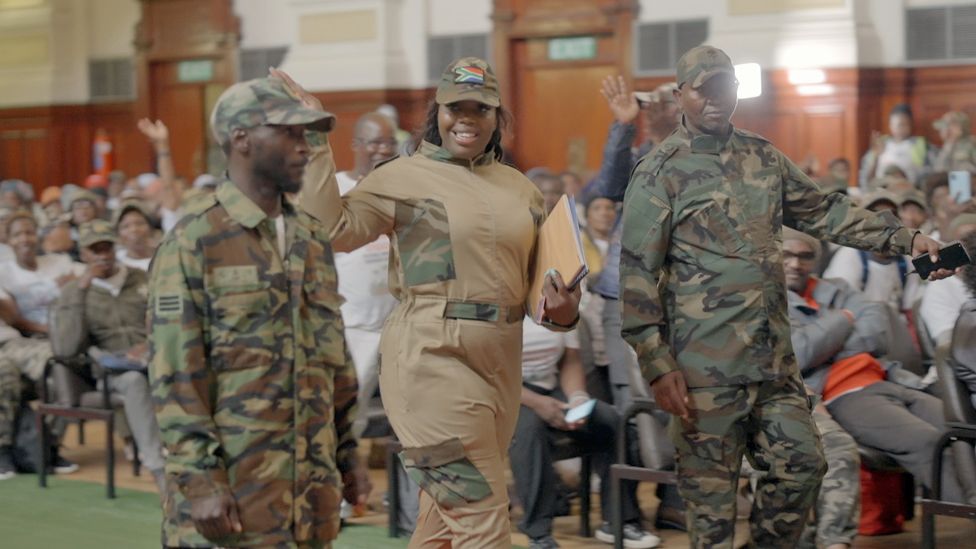-

-
-
Loading

Loading

Operation Dudula, a vigilante group in South Africa, has gained notoriety for targeting businesses owned by foreign nationals and forcing them to close down. BBC Africa Eye has obtained rare access to members of this anti-migrant street movement. Dimakatso Makoena, a 57-year-old single parent of three, works as a cook in a school kitchen in Kwa Thema, a township east of Johannesburg. Makoena expresses her disdain for foreigners, saying she wishes they would leave the country. She shows a picture of her son, who is emaciated and covered in burn scars from an incident where he was electrocuted while trying to steal power cables to support his drug habit. Makoena attributes the availability of drugs to foreigners, which explains her support for Operation Dudula. Operation Dudula was established in Soweto two years ago and was the first group to formalize xenophobia-fueled vigilante attacks that have been taking place in South Africa since the end of white-minority rule in 1994. The group identifies as a civic movement with an anti-migrant agenda. Soweto, once a hub of anti-apartheid resistance and Nelson Mandela's home, has now become the center of this anti-migrant movement. While the unemployment rate in South Africa is high and the country suffers from extreme inequality, the actual number of migrants in the country has been exaggerated. According to a report by the Institute for Security Studies, there are approximately 3.95 million migrants in South Africa, making up 6.5% of the population. This figure is in line with international norms. However, the xenophobic rhetoric used by public officials, politicians, and anti-migrant groups has perpetuated the myth that the country is overrun with migrants. Operation Dudula has now transformed itself from a local anti-migrant group into a national political party with ambitions to contest the next general election. The group's president, Zandile Dabula, blames foreigners for South Africa's economic hardships and claims they are working on a 20-year plan to take over the country. However, there is no evidence to support this claim. The BBC joins Operation Dudula on a confrontation with a Mozambican shopkeeper who is accused of not paying his rent. The encounter quickly turns into a confrontation, with threats of violence. Operation Dudula supporters argue that they are enforcing the law and claim that the influx of foreigners has led to increased drug problems and the loss of local businesses. South African President Cyril Ramaphosa has condemned anti-migrant protests and vigilante groups, likening their behavior to the oppressive strategies of the apartheid regime. However, activists argue that the blame is misplaced and that migrants should be admired for their survival skills. Campaigners believe the government should do more to address the issues that lead to the scapegoating of migrants. Operation Dudula's first national conference took place in Johannesburg, where the group voted to register as a political party. While the supporters celebrate, some of the songs they sing carry threatening messages. However, members of the party insist they do not promote violence and that their aim is to prevent foreigners from taking over the country. The documentary highlights the toxic mix of poverty, drugs, and fear that has resulted in migrants becoming scapegoats in South Africa. The changing political landscape reflects dissatisfaction with the current state of affairs, but it is important to address the underlying issues rather than blaming migrants for the country's problems.